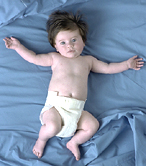
THURSDAY, Sept. 27 (HealthDay News) — Many U.S. babies born to mothers infected with hepatitis B do not receive recommended follow-up testing after vaccination, a new study finds.
About 25,000 infants are born to hepatitis B-infected mothers each year in the United States, according to background information in the study. Without vaccination, 40 to 90 percent of those infants would become infected. Up to 90 percent of those who contracted the virus would develop chronic infection and possibly die from cirrhosis or liver cancer.
Infants born to mothers infected with hepatitis B should receive the hepatitis B vaccine and hepatitis B immune globulin within 12 hours of birth, the federal Advisory Committee on Immunization Practices recommends. Infants should complete the three-dose hepatitis B series, which is up to 95 percent effective in preventing infections.
Between ages 9 months and 18 months, these infants should also receive post-vaccination blood testing to ensure they did not become infected and are protected, the committee advises. The virus is usually not detected until complications develop.
The study, by Ruthie Benson of the Texas Department of State Health Services and colleagues, is published in the Sept. 28 issue of the U.S. Centers for Disease Control and Prevention’s Morbidity and Mortality Weekly Report.
For the study, the researchers analyzed data from the Enhanced Perinatal Hepatitis B Case Management Projects. They found that more than 80 percent of infants received recommended vaccinations but only 64 percent also received recommended follow-up testing.
Of those infants, 93 percent were protected from hepatitis B infection, 1 percent became infected and 3 percent were still susceptible to infection. Susceptible infants can be revaccinated and retested.
Timely post-vaccination blood testing is critical to protect infants against hepatitis B infection and to monitor progress toward eliminating the transmission of hepatitis B from mothers to infants, the researchers concluded.
More information
The Hepatitis B Foundation has more about hepatitis B and pregnancy.

